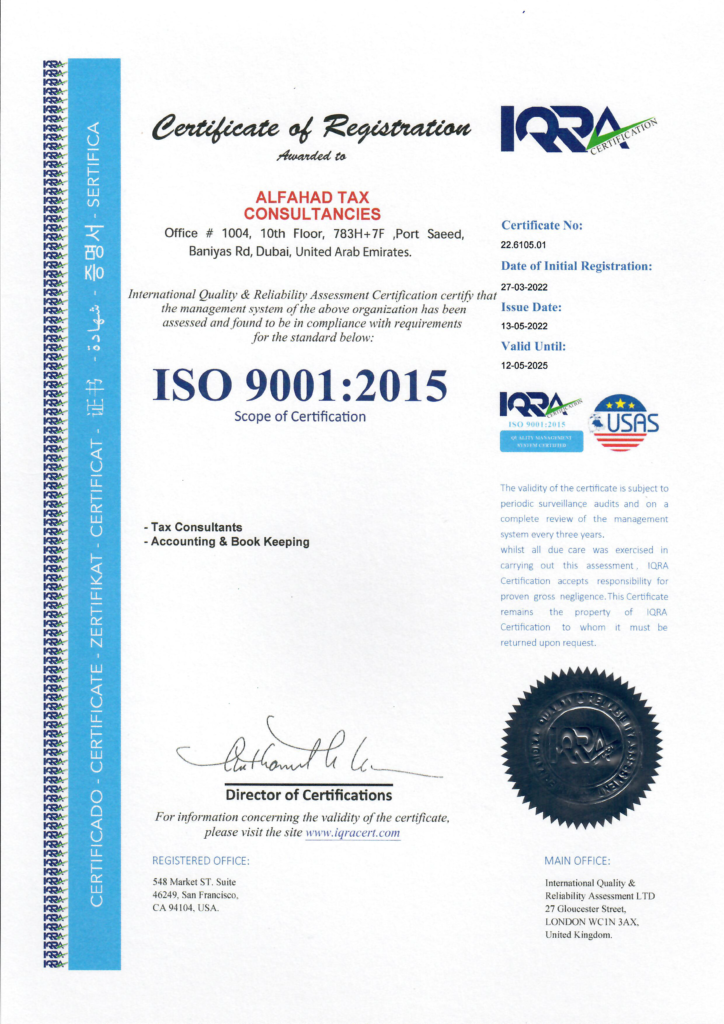LLC & Off-shore Liquidation
Liquidation of a company is a lengthy process that can be forced or consensual.
Let's discuss your requirements
What is a Liquidator?

Our Accounting Outsourcing Process

Appointing a Liquidator

Advertisement in the newspapers

Notification of the Competent Authority and the Registrar of the Dissolution

Obtaining Certificate of deregistration
How can AlFahad Tax Consultancies help you liquidate LLC company?



Liquidation can be a difficult process. That is to say, we will relieve you of all your responsibilities and will manage all legal procedures required by UAE legislation, including:
- filing relevant documents with relevant authorities
- advertising in the newspapers
- the preparation of Final Account of the Liquidation.
What are the many forms of business closures?
The corporation may be wound up in one of two ways:
Summary Winding Up: A summary winding up is used when a firm has no liabilities or is able to discharge them within six months, and it starts with a statement of solvency.
- Creditors Winding Up: A creditors’ winding up begins when the company passes a resolution, followed by a meeting with the company’s creditors.
Court Winding Up:Court adjournment in accordance with UAE Commercial Transactions Law No. 18 of 1993 (Volume 5, Bankruptcy and Preventive Composition) and other applicable laws.
What is the difference between the two stages of the liquidation process?
- First, is the termination of the company’s license/s
- Second, is the company deregistration or dissolution Both of these stages involve the submission of resolutions and may include a public notification process.
How do you wrap up a summary?
I. Appointment of liquidator
On or after the start date of a summary winding up, the company should appoint a liquidator for the purposes of the winding up by passing a Resolution.
All of the directors’ powers terminate upon the appointment of a liquidation, except to the extent that the Resolution appointing the liquidator or any future Resolution otherwise specifies, and subject to any such Resolution and Regulation. The liquidator will thereafter be allowed to exercise all of those powers.
Why is it mandatory to appoint a Liquidator in the winding up of a company?
When a company is winding up, it is required to appoint a Liquidator, who performs a crucial function by assessing the company’s assets and liabilities and properly settling those liabilities.
Upon the appointment of the Liquidator for the company’s winding up, all of the company’s Shareholders/Directors’ powers will be revoked. The Liquidator will determine the company’s financial situation at the time of liquidation and will be responsible for the discharge of the company’s assets and liabilities. All of this will be included in the Liquidation Report that the Liquidator will produce during the winding-up process.
Who can be appointed as a Liquidator of the company?
The Legal Registrar may prescribe the qualifications required for a Liquidator.
II. Application of assets and settling
The Legal Registrar should receive a statement verifying that the company has no assets or obligations. As a result, the statement should be signed by each of the directors or, if the distribution has been completed by a liquidator, by the liquidator, stating that each director or (as the case may be) the liquidator is satisfied that the company has no assets and no liabilities, and that the company is dissolved upon the registration of the statement.
III. Liquidator Report and Closed Audit Report
Finally, DMCC should receive the liquidator’s report and the final closed audit report. If the liquidator is an audit firm, on the other hand, both reports can be prepared by them and submitted to DMCC.
IV. End of Liquidation
Upon completion of the requirements and process, DMCC shall issue the following to be collected through DMCC Client Service Centre Counters:
- License Termination Letter
- De-registration Letter
Our Strengths

Offices in the UAE

Clients Served

Years of Experience

Employees
















